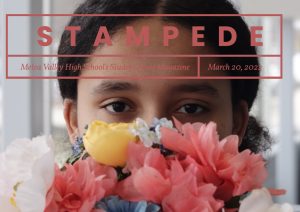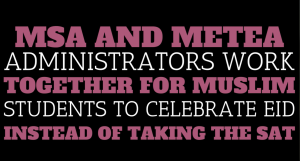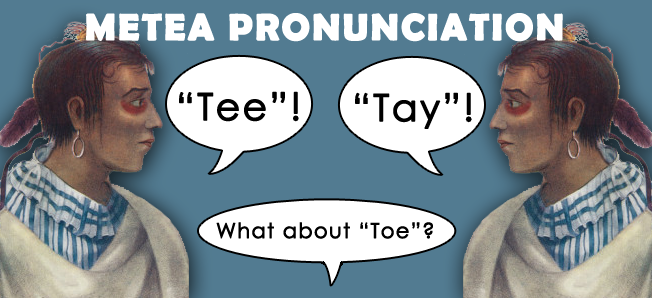(It’s Levi-OH-sa, not Levio-SA.)
This article was revised and corrected on Nov. 15 to appeal to a broader audience.
Before Metea’s opening, school administrators voted on how “Metea” would officially be pronounced. They decided on the (incorrect) “muh-tay-uh,” before contacting experts on the language.
However, when choir director Mr. Bramstedt was writing the school alma mater, he got caught on how downright ugly “muh-tay-uh” sounded in song. Honestly, a school’s name just shouldn’t sound ugly when sung in its very own alma mater. Bramstedt contacted the Potawatomi tribe and asked for the correct pronunciation. The Potawatomi responded with “muh-TEE-uh.” The reason for so much confusion on the pronunciation of his name, and many other Native American names, was the fact that European settlers did not record these names correctly. According to English pronunciation, Metea should have been spelled “Metia.”
The faculty and staff quickly adjusted to the proper pronunciation once they heard Bramstedt’s clarification with the Potawatomi tribe, but the damage was done. Still, students and staff weren’t sure which pronunciation was correct, and the confusion turned into an all out war between the “tees” and the “tays.” Okay, well not an “all-out war” exactly. More of a disagreement-turned-annoyance that is passive aggressively expressed over MVHS Confessions’ Facebook page.
English teacher Mr. Solgos found the problem particularly annoying and went as far as hosting a mini-lesson about the pronunciation of the school’s name. Solgos’ pronunciation fun began with a mini-lesson about the pronunciation of the state “Oregon”, on whether it was “Or-eh-GON” or “Or-eh-GUN” (it’s “Or-eh-gun”, despite Solgos’ previous and embarrassingly Midwestern belief in the former).
Suffice it to say, “muh-tee-uh” is correct. After all, you heard it here first, straight from the mustang’s mouth.
By Jenna Keeney
Graphic by Andrea Lin
Chief Metea’s Speech at the Treaty of Chicago on behalf of the Potawatomi:
“My father, – We have listened to what you have said. We shall now retire to our campus and consult upon it. You will hear nothing more from us at present. [This is a uniform custom of all the Indians. When the council was again convened, Metea continued.] We meet you here to-day, because we had promised it, to tell you our minds, and what we have agreed upon among ourselves. You will listen to us with a good mind, and believe what we say. You know that we first came to this country, a long time ago, and when we sat ourselves down upon it, we met with a great many hardships and difficulties. Our country was then very large; but it has dwindled away to a small spot, and you wish to purchase that! This has caused us to reflect much upon what you have told us; and we have, therefore, brought all the chiefs and warriors, and the young men and women and children of our tribe, that one part may not do what others object to, and that all may be witness of what is going forward. You know your children. Since you first came among them, they have listened to your words with an attentive ear, and have always hearkened to your counsels. Whenever you have had a proposal to make to us, whenever you have had a favor to ask of us, we have always lent a favorable ear, and our invariable answer has been ‘yes.’ This you know! A long time has passed since we first came upon our lands, and our old people have all sunk into their graves. They had sense. We are all young and foolish, and do not wish to do any thing that they would not approve, were they living. We are fearful we shall offend their spirits, if we sell our lands; and we are fearful we shall offend you, if we do not sell them. This has caused us great perplexity of thought, because we have counselled (sic) among ourselves, and do not know how we can part with the land. Our country was given to us by the Great Spirit, who gave it to us to hunt upon, to make our cornfields upon, to live upon, and to make down our beds upon when we die. And he would never forgive us, should we bargain it away. When you first spoke to us for lands at St. Mary’s, we said we had a little, and agreed to sell you a piece of it; but we told you we could spare no more. Now you ask us again. You are never satisfied! We have sold you a great tract of land, already; but it is not enough! We sold it to you for the benefit of your children, to farm and to live upon. We have now but little left. We shall want it all for ourselves. We know not how long we may live, and we wish to have some lands for our children to hunt upon. You are gradually taking away our hunting-grounds. Your children are driving us before them. We are growing uneasy. What lands you have, you may retain forever; but we shall sell no more. You think, perhaps, that I speak in passion; but my heart is good towards you. I speak like one of your own children. I am an Indian, a red-skin, and live by hunting and fishing, but my country is already too small; and I do not know how to bring up my children, if I give it all away. We sold you a fine tract of land at St. Mary’s. We said to you then it was enough to satisfy your children, and the last we should sell: and we thought it would be the last you would ask for. We have no told you what we had to say. It is what was determined on, in a council among ourselves; and what I have spoken, is the voice of my nation. On this account, all our people have come here to listen to me; but do not think we have a bad opinion of you. Where should we get a bad opinion of you? We speak to you with a good heart, and the feelings of a friend. You are acquainted with this piece of land – the country we live in. Shall we give it up? Take notice, it is a small piece of land, and if we give it away, what will become of us? The Great Spirit, who has provided it for our use, allows us to keep it, to bring up our young men and support our families. We should incur his anger, if we bartered it away. If we had more land, you should get more; but our land has been wasting away ever since the white people became our neighbors, and we have now hardly enough left to cover the bones of our tribe. You are in the midst of your red children. What is due to us in money, we wish, and will receive at this place; and we want nothing more. We all shake hands with you. Behold our warriors, our women, and children. Take pity on us and on our words.”








Alex Dillpickle • Nov 14, 2013 at 8:53 am
Yes the right way: Me-TAY-a
Andy See • Nov 4, 2013 at 2:21 pm
WOW! It REALLY grinds my grears when people say metea wrong! Its like come on fellow students what are you thinking! I think metea needs to make it its goal to get out there the right way to say it! GO GO MUSTANGS!
<3 Andy See